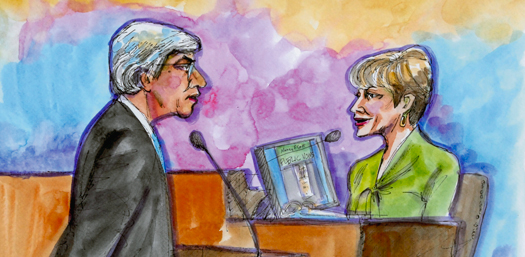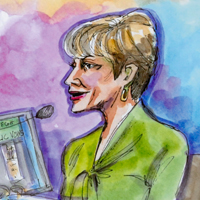Marriage News Blog

On the first and second days of trial, Professor Nancy Cott testified about the history of marriage in the United States. Her testimony explained marriage as a secular, public institution that has evolved throughout American history.
 Professor Cott is the Jonathan Trumbull Professor of American History at Harvard University.┬Ā She is the author of the book Public Vows: A History of Marriage and the Nation.
Professor Cott is the Jonathan Trumbull Professor of American History at Harvard University.┬Ā She is the author of the book Public Vows: A History of Marriage and the Nation.
Yeardley Smith reenacted Professor CottŌĆÖs testimony at the Los Angeles premiere reading of ŌĆ£8.ŌĆØ┬Ā (You may recognize Yeardley as the voice of Lisa Simpson.)
Testimony Highlights
┬ĀŌĆ£[Marriage] is a unique institution, as an evaluation of a couple’s choice to live with each other, to remain committed to one another, and to form a household based on their own feelings about one another, and their agreement to join in an economic partnership and support one another in terms of the material needs of life.ŌĆØ
ŌĆ£[C]ivil law has been supreme in defining and regulating marriage.ŌĆØ
ŌĆ£[M]arriage, the ability to marry, to say, ŌĆśI do,ŌĆÖ it is a basic civil right. It expresses the right of a person to have the liberty to be able to consent validly.
ŌĆ£And this can be seen very strikingly in American history through the fact that slaves during the period, the long period that American states had slavery, slaves could not marry legally.ŌĆØ
ŌĆ£[B]y excluding same-sex couples from the ability to marry and engage in this highly-valued institution,ŌĆØ society is denying itself ŌĆ£another resource for stability and social order.ŌĆØ
ŌĆ£[M]arriage, the ability to marry, to say, ŌĆśI do,ŌĆÖ it is a basic civil right. It expresses the right of a person to have the liberty to be able to consent validly.ŌĆØ
ŌĆ£There has never been a requirement that a couple produce children in order to have a valid marriage. Of course, people beyond procreative age have always been allowed to marry. And known sterility or barrenness in a woman has never been a reason not to allow a marriage.
ŌĆ£In fact, it’s a surprise to many people to learn that George Washington, who is often called the father of our country, was sterile, and was known to be sterile because he was in a second marriage to a woman who had had children. And after George Washington and she married, they had no children.
ŌĆ£[P]rocreative ability has never been a qualification for marriage.ŌĆØ
“Racially-restrictive marriage laws ŌĆ£prevented individuals from having complete choice on whom they married, in a way that designated some groups as less worthy than other groups, and some marriages as less worthy than other marriages. ŌĆ” [T]hese laws were defended as naturally-based and God’s plan just being put into positive law, the efforts to undo them met extreme alarm among those who thought these laws were correct. ŌĆ” [P]eople who supported such laws saw these as very important definitional features of who could and should marry, and who could not and should not.ŌĆØ
ŌĆ£[T]hroughout the entire 19th century, ŌĆ” the primacy of the husband as the legal and economic representative of the couple, and the protector and provider for his wife, was seen as absolutely essential to what marriage was. That asymmetry was seen as absolutely essential.
ŌĆ£[C]urrently, spousal roles are gender-neutral, in terms of the states’ assignment of them; that both spouses are obligated to support one another, but they are not obligated to do one another with a specific emphasis on one spouse being the provider and the other being the dependent.ŌĆØ
“No-fault divorce ŌĆ£was an indication of the shift ŌĆ” [that] spousal roles used to be dictated by the state. Now they are dictated by the couple themselves. ThereŌĆÖs no requirement that they do X or Y if they are one spouse or the other.ŌĆØ
ŌĆ£[T]he purpose of the state in licensing and incentivizing marriage is to create stable households in which the adults who reside there and are committed to one another by their own consents will support one another as well as their dependents.ŌĆØ
ŌĆ£[M]arriage has through our history had a very strong governance function at the same time that it is characterized by liberty. Marriage is only possible for individuals who can exercise the liberty, value of our citizens, and it has also beenŌĆöparticularly in the 20th centuryŌĆöthe realm created by marriage, that private realm has been repeatedly reiterated as aŌĆöas a realm of liberty for intimacy and free decision making by the parties in that private realm.ŌĆØ
ŌĆ£The institution of marriage has always been at least as much about supporting adults as it has been about supporting minors.ŌĆØ
